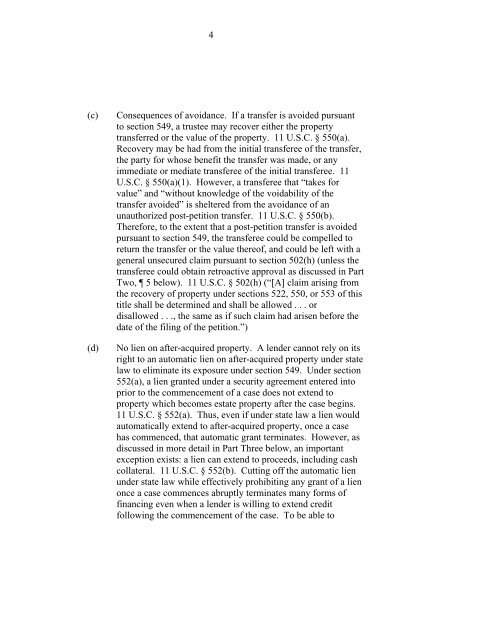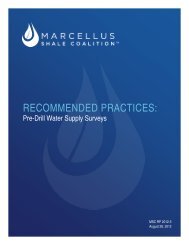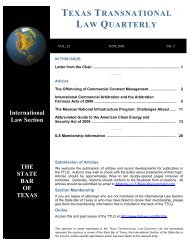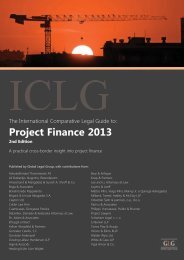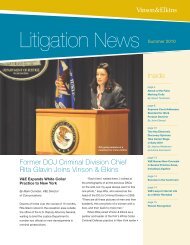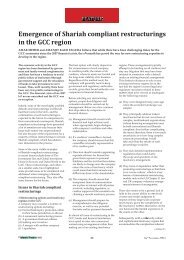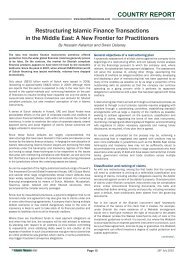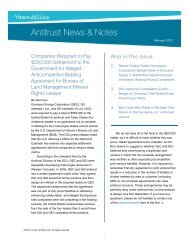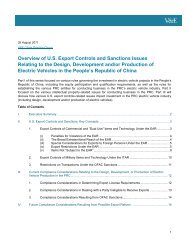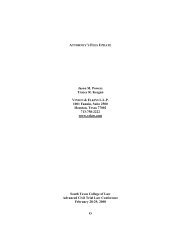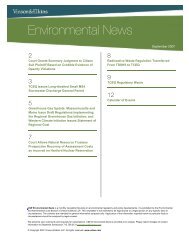12 AN INTRODUCTION TO DIP FINANCING Jane Lee
12 AN INTRODUCTION TO DIP FINANCING Jane Lee
12 AN INTRODUCTION TO DIP FINANCING Jane Lee
You also want an ePaper? Increase the reach of your titles
YUMPU automatically turns print PDFs into web optimized ePapers that Google loves.
4<br />
(c)<br />
(d)<br />
Consequences of avoidance. If a transfer is avoided pursuant<br />
to section 549, a trustee may recover either the property<br />
transferred or the value of the property. 11 U.S.C. § 550(a).<br />
Recovery may be had from the initial transferee of the transfer,<br />
the party for whose benefit the transfer was made, or any<br />
immediate or mediate transferee of the initial transferee. 11<br />
U.S.C. § 550(a)(1). However, a transferee that “takes for<br />
value” and “without knowledge of the voidability of the<br />
transfer avoided” is sheltered from the avoidance of an<br />
unauthorized post-petition transfer. 11 U.S.C. § 550(b).<br />
Therefore, to the extent that a post-petition transfer is avoided<br />
pursuant to section 549, the transferee could be compelled to<br />
return the transfer or the value thereof, and could be left with a<br />
general unsecured claim pursuant to section 502(h) (unless the<br />
transferee could obtain retroactive approval as discussed in Part<br />
Two, 5 below). 11 U.S.C. § 502(h) (“[A] claim arising from<br />
the recovery of property under sections 522, 550, or 553 of this<br />
title shall be determined and shall be allowed . . . or<br />
disallowed . . ., the same as if such claim had arisen before the<br />
date of the filing of the petition.”)<br />
No lien on after-acquired property. A lender cannot rely on its<br />
right to an automatic lien on after-acquired property under state<br />
law to eliminate its exposure under section 549. Under section<br />
552(a), a lien granted under a security agreement entered into<br />
prior to the commencement of a case does not extend to<br />
property which becomes estate property after the case begins.<br />
11 U.S.C. § 552(a). Thus, even if under state law a lien would<br />
automatically extend to after-acquired property, once a case<br />
has commenced, that automatic grant terminates. However, as<br />
discussed in more detail in Part Three below, an important<br />
exception exists: a lien can extend to proceeds, including cash<br />
collateral. 11 U.S.C. § 552(b). Cutting off the automatic lien<br />
under state law while effectively prohibiting any grant of a lien<br />
once a case commences abruptly terminates many forms of<br />
financing even when a lender is willing to extend credit<br />
following the commencement of the case. To be able to


